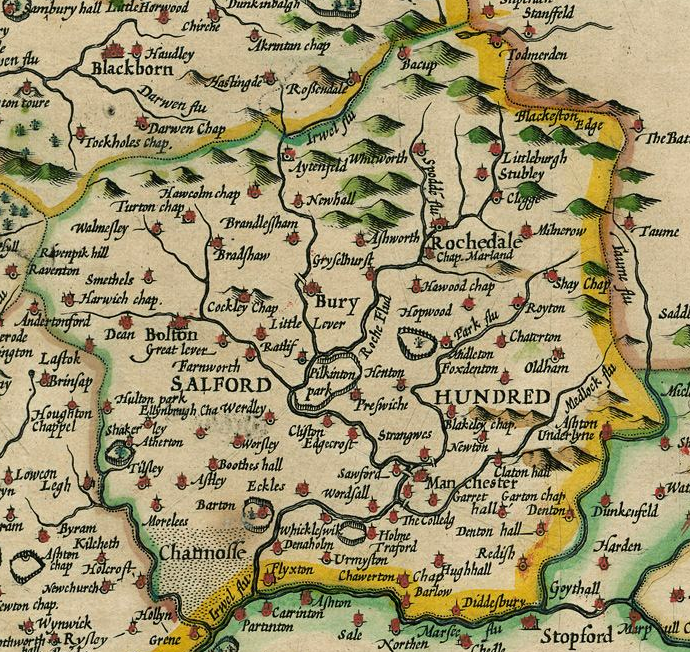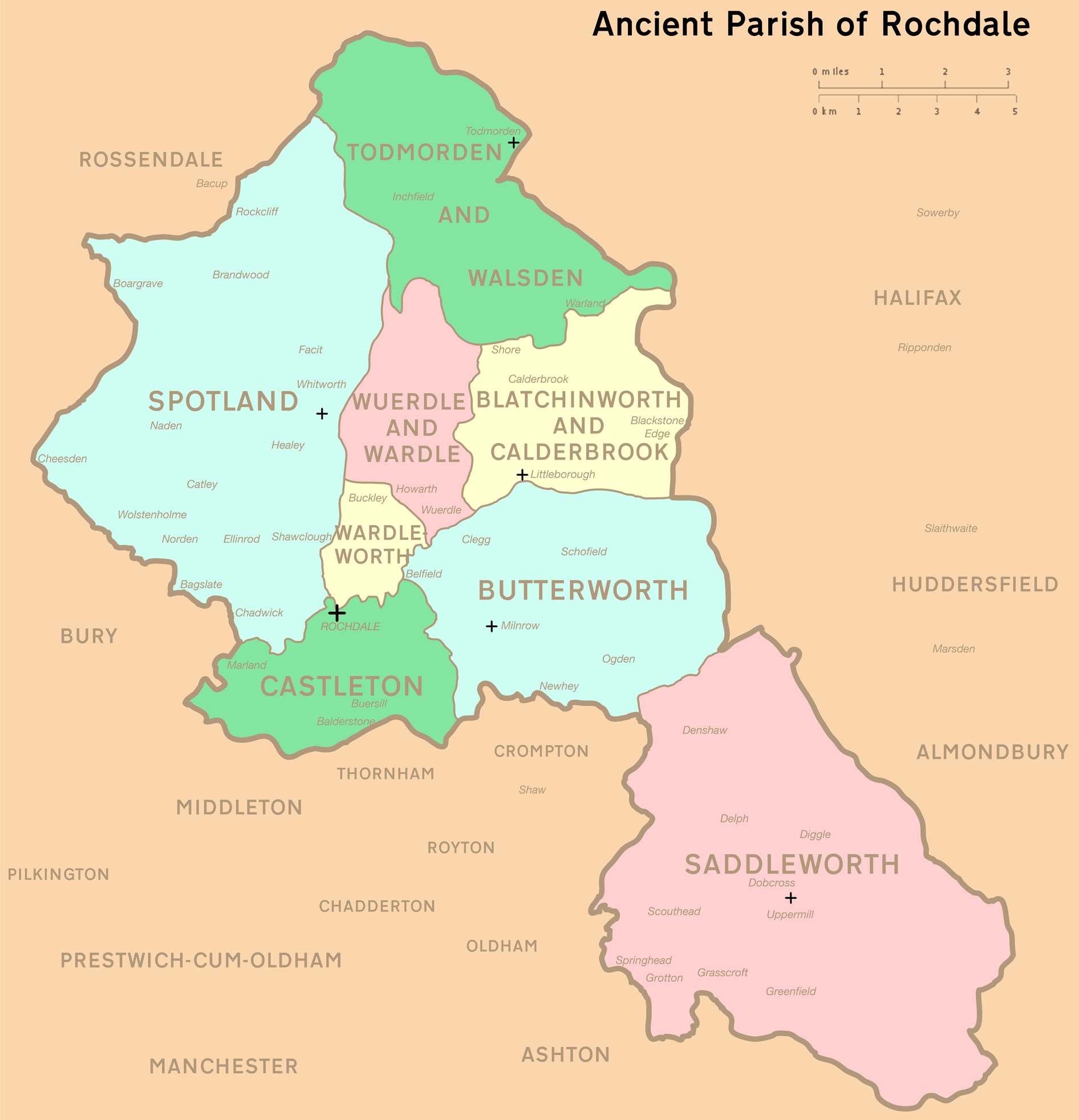|
Wardle, Greater Manchester
Wardle (; pop. 7,092) is a village near Littleborough within the Metropolitan Borough of Rochdale, in Greater Manchester, England. It lies amongst the foothills of the South Pennines, east-southeast of Whitworth, north-northwest of Rochdale and north-northeast of the city of Manchester. Historically a part of Lancashire, Wardle and its surroundings have provided archaeological evidence of Mesolithic activity in the area. The name Wardle is said to be derived from "Ward Hill", implying "fortified place". Brown Wardle Hill overlooks the village from the north, its name being derived from the Celtic word ''bron'' meaning "round". During the Middle Ages Wardle was a small centre of domestic flannel and woollen cloth production, and many of the original weavers' cottages survive today as listed buildings. Wardle, the most northerly settlement in Greater Manchester,Rochdale Metropolitan Borough Council (N.D.), p. 33. encompasses small parts of Smallbridge and Dearnley â ... [...More Info...] [...Related Items...] OR: [Wikipedia] [Google] [Baidu] |
Metropolitan Borough Of Rochdale
The Metropolitan Borough of Rochdale is a metropolitan borough of Greater Manchester in North West England. It is named after its largest town, Rochdale, The borough covers other outlying towns and villages with a population of 206,500 at the 2011 census. It is the ninth-largest district by population in Greater Manchester. History The borough was formed in 1974 as part of the provisions of the Local Government Act 1972 and is an amalgamation of six former local government districts. It was originally proposed that the borough include the neighbouring town of Bury and disclude Middleton; Bury however went on to form the administrative centre for the adjacent Metropolitan Borough of Bury. The borough was formed by a merger of the former county borough of Rochdale and from the administrative county of Lancashire, the municipal boroughs of Heywood and Middleton, along with the urban districts of Littleborough, Milnrow and Wardle.The borough lies mostly within the historic count ... [...More Info...] [...Related Items...] OR: [Wikipedia] [Google] [Baidu] |
Woollen
Woolen (American English) or woollen (Commonwealth English) is a type of yarn made from carded wool. Woolen yarn is soft, light, stretchy, and full of air. It is thus a good insulator, and makes a good knitting yarn. Woolen yarn is in contrast to worsted yarn, in which the fibers are combed to lie parallel rather than carded, producing a hard, strong yarn.Burnham (1980), p. 191 Commercial manufacture The woolen and worsted process both require that the wool (and other similar animal fibres, cashmere, camel, etc.) be cleaned before mechanical processing. Woolen and worsted nomenclatures apply only to the textile processing of animal fibres, but it has become common to include fibre blends under these terms. The resultant fabrics will be classified as being either woolen or worsted, but this designation is assigned during fiber processing and yarn formation, not in the cloth or finished garment. A woven woolen fabric is one which is subjected to fabric finishing techniques de ... [...More Info...] [...Related Items...] OR: [Wikipedia] [Google] [Baidu] |
Local Authority
Local government is a generic term for the lowest tiers of public administration within a particular sovereign state. This particular usage of the word government refers specifically to a level of administration that is both geographically-localised and has limited powers. While in some countries, "government" is normally reserved purely for a national administration (government) (which may be known as a central government or federal government), the term local government is always used specifically in contrast to national government – as well as, in many cases, the activities of sub-national, first-level administrative divisions (which are generally known by names such as cantons, provinces, states, oblasts, or regions). Local governments generally act only within powers specifically delegated to them by law and/or directives of a higher level of government. In Federation, federal states, local government generally comprises a third or fourth tier of government, whereas in un ... [...More Info...] [...Related Items...] OR: [Wikipedia] [Google] [Baidu] |
Salford (hundred)
The Salford Hundred (also known as Salfordshire) was one of the subdivisions of the historic county of Lancashire, in Northern England (see:Hundred (county division). Its name alludes to its judicial centre being the township of Salford (the suffix ''-shire'' meaning the territory was appropriated to the prefixed settlement). It was also known as the Royal Manor of Salford and the Salford wapentake.. Origins The Manor or Hundred of Salford had Anglo-Saxon origins. The ''Domesday Book'' recorded that the area was held in 1066 by Edward the Confessor. Salford was recorded as part of the territory of ''Inter Ripam et Mersam'' or "Between Ribble and Mersey", and it was included with the information about Cheshire, though it cannot be said clearly to have been part of Cheshire. The area became a subdivision of the County Palatine of Lancaster (or Lancashire) on its creation in 1182. Salford Hundred Court In spite of its incorporation into Lancashire, Salford Hundred retained a se ... [...More Info...] [...Related Items...] OR: [Wikipedia] [Google] [Baidu] |
Rochdale (ancient Parish)
Rochdale was an ecclesiastical parish of early-medieval origin in northern England, administered from the Church of St Chad, Rochdale. At its zenith, it occupied of land amongst the South Pennines, and straddled the historic county boundary between Lancashire and the West Riding of Yorkshire. To the north and north-west was the parish of Whalley; to the southwest was the parish of Bury; to the south was Middleton and Prestwich-cum-Oldham. Anciently a dependency of Whalley Abbey, the parish of Rochdale is believed to be of Anglo-Saxon origin, as evidenced by historical documentation, toponymy and its dedication to Chad of Mercia. Urbanisation, population shifts, and local government reforms all contributed towards the gradual alteration and ultimate dissolution of the historic parish boundaries; the social welfare functions of the parish were broadly superseded by the English Poor Laws and new units of local governance, such as the County Borough of Rochdale and the Milnrow Ur ... [...More Info...] [...Related Items...] OR: [Wikipedia] [Google] [Baidu] |
Hundersfield
Hundersfield ( ; also more anciently known as Honersfield and Honnersfield) was a manor, parish and, from 1746, township, within the parish of Rochdale, in the hundred of Salford, England. It straddled the historic county boundary between Lancashire and the West Riding of Yorkshire. There are written references to the parish dating back to 1202. Hundersfield lay on high moorland around Blackstone Edge, containing the settlements of Todmorden, Walsden, Littleborough, Wardle, Smallbridge and parts of Rochdale Rochdale ( ) is a large town in Greater Manchester, England, at the foothills of the South Pennines in the dale on the River Roch, northwest of Oldham and northeast of Manchester. It is the administrative centre of the Metropolitan Borough .... The name Hundersfield is a corruption of Honorsfield; and that was derived from the word "Honore", signifying a Saxon lord. Hundersfield was originally one of four townships within Rochdale, but was itself split into ... [...More Info...] [...Related Items...] OR: [Wikipedia] [Google] [Baidu] |
Township (England)
In England, a township (Latin: ''villa'') is a local division or district of a large parish containing a village or small town usually having its own church. A township may or may not be coterminous with a chapelry, manor, or any other minor area of local administration. The township is distinguished from the following: *Vill: traditionally, among legal historians, a ''vill'' referred to the tract of land of a rural community, whereas ''township'' was used when referring to the tax and legal administration of that community. *Chapelry: the 'parish' of a chapel (a church without full parochial functions). *Tithing: the basic unit of the medieval Frankpledge system. 'Township' is, however, sometimes used loosely for any of the above. History In many areas of England, the basic unit of civil administration was the parish, generally identical with the ecclesiastical parish. However, in some cases, particularly in Northern England, there was a lesser unit called a township, being a ... [...More Info...] [...Related Items...] OR: [Wikipedia] [Google] [Baidu] |
History Of Lancashire
Lancashire is a county of England, in the northwest of the country. The county did not exist in 1086, for the Domesday Book, and was apparently first created in 1182, making it one of the youngest of the traditional counties. The historic county consisted of two separate parts. The main part runs along the northwestern coast of England. When it included Manchester and Liverpool it had a greatest length of 76 miles, and breadth of 45 miles, and an area of 1,208,154 acres. The northern detached part of the old county palatine, consisting of Furness and Cartmell was 25 miles in length, 23 miles in breadth and was separated from the main portion of Lancashire by Morecambe Bay and the Kendal district of Westmorland. The highest point in the historic county is at the Old Man of Coniston. As a county palatine, the Duke of Lancaster had sovereignty rights in the areas of justice and administration within the county. However the third man to hold the title, Henry Bolingbroke seized ... [...More Info...] [...Related Items...] OR: [Wikipedia] [Google] [Baidu] |
Wardle High Logo
Wardle may refer to: Places *Wardle, Greater Manchester, England * Wardle, Cheshire, England People * Arthur Wardle (1864–1949), English painter * David Wardle (born 1959), classicist * Ernie Wardle (born 1930), English footballer * Harry Wardle (1881–1918), English footballer * Huon Wardle, (born 1967), English anthropologist *Jah Wobble, stage name of John Joseph Wardle (born 1958), English musician *Johnny Wardle, (1923–1985), English cricketer *Josh Wardle Josh Wardle is a Welsh software engineer who developed the viral web-based word game '' Wordle''. The New York Times Company acquired ''Wordle'' from Wardle in late January 2022. Wardle lives in Brooklyn, New York. Early life and education ..., software engineer and creator of Wordle * Piers Wardle, (1960–2009), English painter and conceptual artist * Sarah Wardle, (born 1969), English poet * Thomas Wardle, (1912–1977), Australian businessman * Thomas Erskine Wardle, (1877–1944), Royal Navy admiral See a ... [...More Info...] [...Related Items...] OR: [Wikipedia] [Google] [Baidu] |
Watergrove Reservoir
Watergrove Reservoir is a reservoir close to Wardle in the Metropolitan Borough of Rochdale, within Greater Manchester, England. Rochdale Corporation chose Watergrove as a suitable site to build a large reservoir largely to a prolonged drought in the 1930s, resulting in water regularly being bought from Oldham Oldham is a large town in Greater Manchester, England, amid the Pennines and between the rivers Irk and Medlock, southeast of Rochdale and northeast of Manchester. It is the administrative centre of the Metropolitan Borough of Oldham .... The ruins of the old village of Watergrove submerged under the large expanse of water in 1938, and dotted around the landscape above the reservoir there are several ruins originally belonging to the village. The book ''Watergrove: A History of the Valley and its Drowned Village'' by Allen Holt gives a personal view of the transition as the author grew up in Wardle, a mile to the south of Watergrove. Several photographs in ... [...More Info...] [...Related Items...] OR: [Wikipedia] [Google] [Baidu] |
Dearnley
Dearnley is a surname. Notable people with the surname include: *Ben Dearnley (born 1964), English sculptor *Christopher Dearnley Christopher Hugh Dearnley (11 February 1930 – 15 December 2000) was an English cathedral organist, who served in Salisbury Cathedral and St Paul's Cathedral. Background Christopher Hugh Dearnley was born on 11 February 1930 in Wolverhampton ... (1930–2000), English organist * Zak Dearnley (born 1998), English football player {{surname ... [...More Info...] [...Related Items...] OR: [Wikipedia] [Google] [Baidu] |





